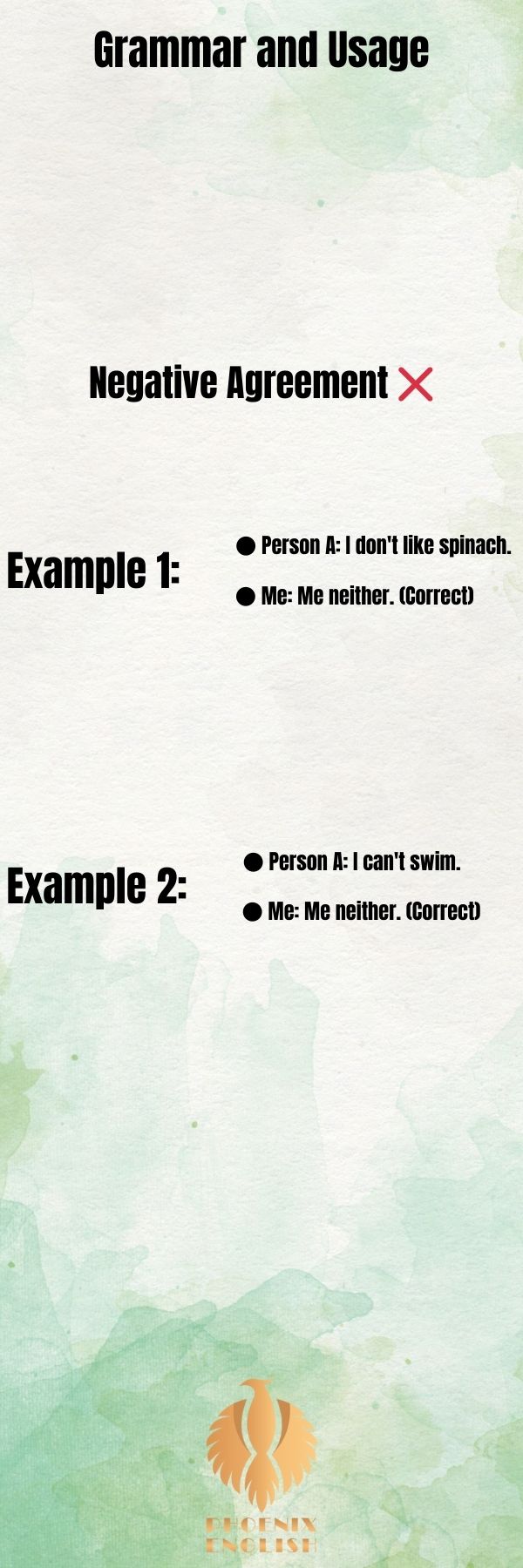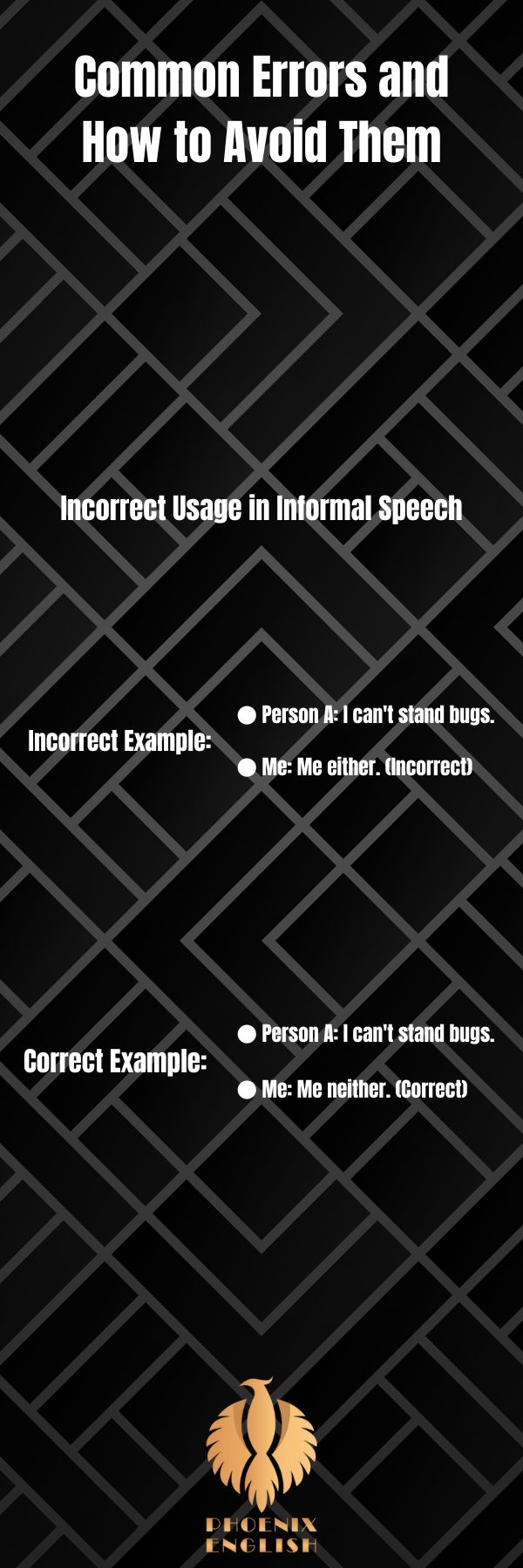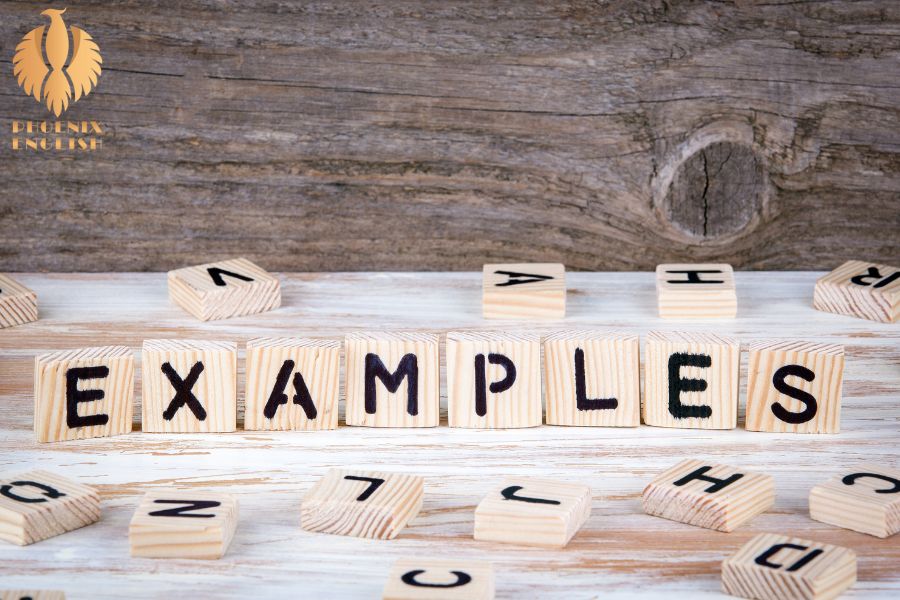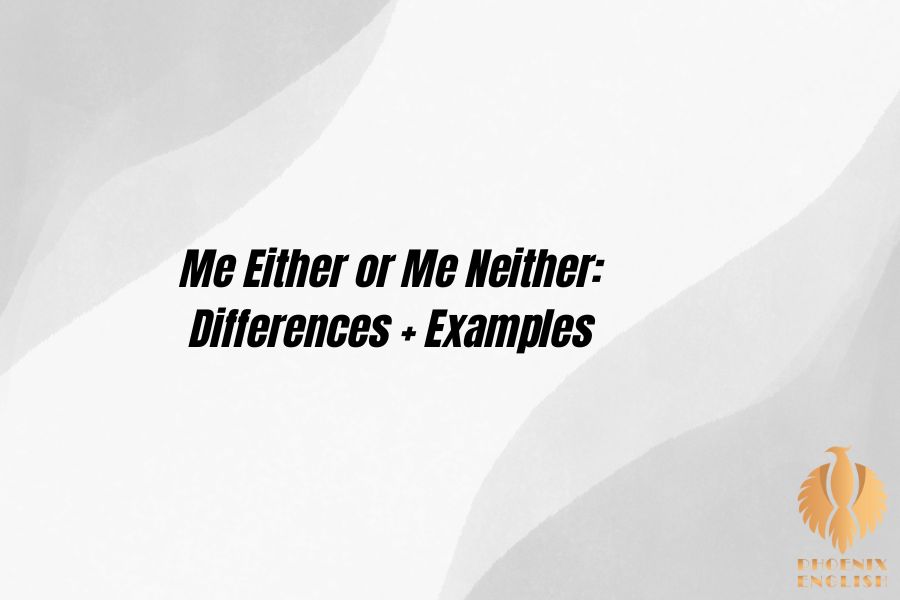When navigating English conversational phrases, particularly me either and me neither, it’s easy to get tripped up. Even for native speakers, these phrases can be tricky due to their nuanced grammatical rules and varying contexts.
For non-native speakers, the challenge can be even more daunting. Me Either is paired with negative sentences but does not stand alone well as a response.
On the other hand, Me Neither is used to agree with a negative statement This comprehensive guide aims to shed light on the differences between me either and me neither, delve into their grammatical implications, and provide numerous examples to illustrate their proper use, ultimately empowering you to use these phrases correctly and confidently.
You might also enjoy: Back On Track Meaning + Examples [2024]
Understanding Me Either and Me Neither
Me Either: This phrase is frequently used incorrectly in place of me neither. When used correctly, either is paired with negative sentences but does not stand alone well as a response. It typically follows a negative clause to add an additional negative element.
Me Neither: This phrase is correctly used to agree with a negative statement. It means I also don‘t or neither do I. When someone makes a negative statement, responding with me neither indicates that you are in the same negative position as the speaker.
The Importance of Context
The choice between me either and me neither heavily depends on the context of the conversation, particularly whether the preceding statement is negative or affirmative.
Understanding the context ensures that you select the correct phrase, maintaining grammatical integrity and clear communication.
You Might Also Enjoy: Cancelled or Canceled; Spelling; Examples [2025]
Grammar and Usage

Negative Agreement ❌
When agreeing with a negative statement, me neither is the grammatically correct choice.
Example 1:
● Person A: I don‘t like spinach.
● Me: Me neither. (Correct)
Example 2:
● Person A: I can‘t swim.
● Me: Me neither. (Correct)
In these examples, I agree with a negative statement made by Person A. Me neither means that I also don‘t like spinach or can‘t swim.
Misuse of Me Either
Some speakers mistakenly use me either instead of me neither in these contexts. While me either is commonly heard in casual conversation, it is grammatically incorrect for negative agreement.
Incorrect Example:
● Person A: I don‘t like spinach.
● Me: Me either. (Incorrect)
In formal and grammatically correct English, me either should not be used in this way. Me neither is the proper answer instead.
Correct Use of Either
Either is used correctly in negative sentences but not as a standalone response. It often appears in a structure with not…either or neither.
Example:
● Person A: I don‘t like spinach.
● Me: I don‘t like it either. (Correct)
In these cases, either is part of a larger negative sentence and agrees with the negative sentiment of the statement.
You might also enjoy: Paid Vs Payed : Differences + Examples [My 2024 Teaching Way]
Detailed Examples and Contexts
To further clarify the differences and appropriate uses of me either and me neither, let’s explore more detailed examples and specific contexts.
Conversations About Preferences and Abilities
When discussing preferences or abilities in a negative context, me neither is used to show agreement.
Example:
● Person A: I don‘t enjoy watching cartoons.
● Me: Me neither.
Conversations About Past Events
When referring to past events that did not happen or were not done, me neither is the correct choice.
Example:
● Person A: I didn‘t go to the gym last week.
● Me: Me neither.
Expressing Lack of Desire or Intention
When expressing a lack of desire or intention to do something, me neither agrees with the negative sentiment.
Example 1:
● Person A: I don‘t want to go out tonight.
● Me: Me neither. (I also don‘t want to go out tonight.)
Example 2:
● Person A: I won‘t be attending the meeting.
● Me: Me neither. (I also won‘t be attending the meeting.)
You Might Also Enjoy: How To Learn English Speaking At Home: My 12 Tips
Conversations Using Either Correctly
To use either correctly, it must be part of a negative sentence and not a standalone response.
Example:
● Person A: I don‘t like coffee.
● Me: I don‘t like it either.(Correct use of either within a negative sentence.)
Common Errors and How to Avoid Them
Incorrect Usage in Informal Speech

One of the most common errors occurs in informal speech where me either is mistakenly used to agree with negative statements.
Incorrect Example:
● Person A: I can‘t stand bugs.
● Me: Me either. (Incorrect)
Correcting the Error
To correct this error, always use me neither to agree with negative statements.
Correct Example:
● Person A: I can‘t stand bugs.
● Me: Me neither. (Correct)
Misunderstanding Sentence Structure
Another error is misunderstanding the structure of sentences involving either and neither.
Incorrect Example:
● Person A: He doesn‘t like cream.
● Me: Me either. (Incorrect)
Correcting the Error with Proper Structure
To avoid this error, remember that either must be part of a larger negative sentence and not a standalone response.
Correct Example:
● Person A: He doesn‘t like cream.
● Me: I don‘t like it either. (Correct use of either within a negative sentence.)
You might also enjoy: Top 100 Commonly Used Verbs That Start With D [2024]
Additional Examples and Practice

To solidify your understanding, here are more examples and practice scenarios:
Scenario 1: Discussing Hobbies
Example:
● Person A: I don‘t enjoy painting.
● Me: Me neither.
In this example, I agree with Person A’s negative statement about not enjoying painting.
Scenario 2: Discussing Plans
Example:
● Person A: I won‘t be joining the charity this year.
● Me: Me neither.
Here, I agree with Person A’s negative statement about not traveling.
Scenario 3: Discussing Opinions
Example:
● Person A: I don‘t think this movie is good enough to watch.
● Me: Me neither.
In this scenario, I agree with Person A’s negative opinion about the movie.
Scenario 4: Discussing Preferences
Example:
● Person A: I don‘t like spicy food.
● Me: Me neither.
I agree with Person A’s negative statement about not liking spicy food.
Practice Exercises
To practice, try responding to the following statements with either me either or me neither.
Practice 1:
● Person A: I don‘t have any pets.
● Me: __________.
● Answer: Me neither.
Practice 2:
● Person A: She doesn‘t know how to paint.
● Me: __________.
● Answer: Me neither.
Practice 3:
● Person A: They didn‘t see the movie.
● Me: __________.
● Answer: Me neither.
Cultural and Regional Differences
Informal vs. Formal English
In informal spoken English, you might hear me either used incorrectly. However, in formal writing and speech, it’s important to use me neither correctly. Understanding this difference helps maintain proper grammar in various contexts.
Regional Variations
While me neither is widely accepted in standard English, some regional variations and dialects might use me either informally.
Awareness of these variations can help in understanding and communicating effectively with speakers from different regions.
You Might Also Enjoy: Top 60 Most Common Simple Sentences In English
Expanded Contexts and Examples
Conversations About Future Plans
When talking about future plans that one does not intend to pursue, me neither should be used to express agreement with the negative intention.
Example 1:
● Person A: I won‘t be going to the party tomorrow.
● Me: Me neither. (I also won‘t be going to the party.)
Example 2:
● Person A: I don‘t plan to join the gym this year.
● Me: Me neither.
Expressing Negative Opinions

When sharing negative opinions about something, me neither helps to show that you agree with the negative viewpoint.
Example:
● Person A: I don‘t like the way this project is going.
● Me: Me neither.
Discussing Negative Experiences
When reflecting on negative experiences, me neither is appropriate to indicate that you had a similar negative experience.
Example 1:
● Person A: I didn‘t enjoy the last part.
● Me: Me neither.
Example 2:
● Person A: I didn‘t find the event attractive to the potential customers.
● Me: Me neither.
Conversations Using Neither Correctly
Using neither correctly in broader contexts can also help reinforce understanding.
Example:
● Person A: Neither of us can come here earlier than 6.
● Me: Yes, neither of us can do it.
In these examples, neither is used to emphasize the negative agreement within a larger context, showing a more formal and precise use of the word.
More Detailed Analysis of Common Errors
Error in Negative Agreement
One common error is using me either when agreeing with a negative statement, which is grammatically incorrect.
Incorrect Example:
● Person A: I don‘t like spicy food.
● Me: Me either. (Incorrect)
Corrected Example:
● Person A: I don‘t like spicy food.
● Me: Me neither.(Correct)
This error stems from misunderstanding how to properly agree with a negative statement. Always using me neither in such cases ensures grammatical correctness.
You might also enjoy: Top 100 Commonly Used Verbs That Start With C [2024]
Misplaced Either
Another error is placing either incorrectly in a sentence, leading to confusion and grammatical inaccuracy.
Incorrect Example:
● Person A: She doesn‘t like cakes.
● Me: Me either. (Incorrect)
Corrected Example:
● Person A: She doesn‘t like cakes.
● Me: I don‘t like it either.(Correct use of either within a negative sentence.)
Detailed Practice and Real-Life Scenarios
Scenario 1: Workplace Conversations

In professional settings, it’s crucial to use correct grammar to maintain clarity and professionalism.
Example:
● Person A: I don‘t think we should follow the new manager.
● Me: Me neither.
This response indicates that you agree with the negative sentiment about the plan, maintaining a professional tone.
Scenario 2: Social Interactions
In social settings, using me neither correctly helps in clear communication and mutual understanding.
Example:
● Person A: I didn‘t enjoy the movie last night.
● Me: Me neither.
Advanced Usage and Subtle Nuances
To further delve into the usage of me either and me neither, it is essential to explore more advanced scenarios and subtle nuances that can arise in everyday conversations. These advanced contexts will help refine your understanding and ensure you use these phrases accurately.
Advanced Contexts and Examples
Expressing Doubts and Uncertainties
In conversations where doubts or uncertainties are expressed, me neither can be used to show alignment with the speaker‘s sentiment.
Example:
● Person A: I don‘t think we‘ll finish the project on time.
● Me: Me neither.
Agreeing with Negative Predictions
When discussing negative predictions about future events, neither can be used to indicate agreement.
Example 1:
● Person A: I don‘t think the weather will be good for the picnic.
● Me: Me neither.
Discussing Hypothetical Situations
In hypothetical discussions, me neither can agree with a negative hypothetical scenario.
Example 1:
● Person A: If I didn‘t have to work, I wouldn‘t stand my boss.
● Me: Me neither.
Nuanced Differences and Further Clarifications
Contextual Sensitivity

Understanding the sensitivity of context is crucial in mastering the use of me either and me neither. In situations where the context is highly sensitive or emotional, choosing the correct phrase can help convey empathy and understanding.
Nuances in Professional Settings
In professional settings, precision in language use can reflect on your professionalism and attention to detail. Using me neither correctly in these contexts can enhance your credibility.
Interactive Practice Exercises
To further reinforce your understanding, here are some interactive practice exercises. Try responding to the following statements using me either or me neither correctly.
Practice 4:
● Person A: I didn‘t receive the email.
● Me: __________.
● Answer: Me neither.
Practice 5:
● Person A: I don‘t think this strategy will work.
● Me: __________.
● Answer: Me neither.
Practice 6:
● Person A: I don‘t want to attend the meeting.
● Me: __________.
● Answer: Me neither.
Expanding to Comparative and Contrasting Sentences
Using Either in Comparisons
When making comparisons, particularly in negative contexts, using either correctly can clarify your stance.
Example 1:
● Person A: I don‘t like chocolate ice cream.
● Me: I don‘t like it either. (Correct use of either within a negative comparison.)
Example 2:
● Person A: She won‘t attend the conference.
● Me: I won‘t attend either. (Correct use of either within a negative context.)
You Might Also Enjoy: How To Speak English Clearly: Top 10 Tips That Works
Using Neither in Contrasts
In contrasting negative statements, neither can help emphasize the negative agreement more clearly.
Example 1:
● Person A: Neither of us wanted to leave early.
● Me: Yes, neither of us wanted to.
Example 2:
● Person A: Neither the red dress nor the blue one fits me.
● Me: Neither fits me either.
Addressing Common Pitfalls and Misunderstandings
Avoiding Ambiguity
One common pitfall is the potential ambiguity when using either and neither incorrectly. Ensuring clarity in your statements can prevent misunderstandings.
Incorrect Example:
● Person A: I don‘t like pizza.
● Me: Me either. (Incorrect and ambiguous)
Correct Example:
● Person A: I don’t like pizza.
● Me: Me neither. (Correct and clear)
Reinforcing Correct Usage
Regular practice and reinforcement of the correct usage of me neither and me either can help embed these phrases in your everyday language.
Practice Scenario:
● Person A: I don‘t think this will work.
● Me: Me neither.
Practice Scenario:
● Person A: I won‘t be available for the meeting tomorrow.
● Me: Me neither.
Integrating Into Daily Conversations
Real-Life Application in Various Scenarios
Integrating these phrases into daily conversations can help solidify their usage. Whether in casual chats with friends, professional discussions at work, or academic debates, practicing these phrases regularly will enhance your fluency.
Extended Practice and Advanced Exercise
Complex sentences can provide an additional layer of practice, helping to understand the nuances and proper usage of me neither and me either.
Complex Sentence Example:
● Person A: Even though we discussed the issue multiple times, I still don‘t understand the concept.
● Me: Me neither.(I also don‘t understand the concept despite the discussions.)
Complex Sentence Example:
● Person A: Despite trying several methods, I can‘t solve the problem.
● Me: Me neither.
You might also enjoy: Time Flies or Flys? What Is The Correct Spelling?
Summary and Reinforcement
Understanding the differences between me either and me neither is crucial for effective communication in English. Below comes a summary of key points:
1. Me neither is used to agree with negative statements: It means I also don‘t or neither do I.
2. Me either is often used incorrectly: While common in informal speech, it is not grammatically correct for negative agreement.
3. Use either correctly within negative sentences: Either should be part of a larger negative structure (e.g., I don‘t like it either).
4. Practice makes perfect: Regularly practicing with examples and scenarios helps solidify understanding and correct usage.
By mastering these distinctions, you can enhance your English communication skills, ensuring clarity and grammatical accuracy in both spoken and written language. With regular practice and a keen understanding of context, you’ll be able to navigate conversations with confidence, using me neither and me either correctly to express agreement or disagreement in various situations.
Final Thoughts and Encouragement
Language learning is a journey, and mastering nuances like me either and me neither is part of that journey. Consistent practice, attention to detail, and an openness to learning from mistakes will help you improve.
Embrace opportunities to use these phrases in different contexts, and don’t be afraid to ask for feedback from native speakers or language teachers.
Remember, effective communication is not just about using correct grammar but also about connecting with others and conveying your thoughts clearly. By honing your skills in using me either and me neither, you’ll be better equipped to participate in meaningful and precise conversations.
Happy learning, and may your journey to mastering English be both enjoyable and rewarding!

Hi, welcome to my blog! My name is Omid and I am thrilled to have you here! I am an English language teacher with 12 years of experience and hold multiple international certifications (TESOL, IELTS, TOEFL, PTE, CELTA). Additionally, I hold a PhD in Applied Linguistics with a specialization in Teaching English as a Second Language (TESL), which fuels my passion for teaching English and assisting others in mastering the language. To me, nothing is more rewarding than helping individuals enhance their English language abilities through various methods. So, let’s embark on this journey of learning English together.




